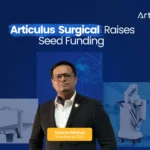Phable Founders (L-R): Mukesh Bansal, Sumit Sinha
Everybody knows someone who suffers from chronic diabetes. While not directly life threatening, diabetes affects quality of life and often increases the risk of various, potentially more dangerous, cardiovascular conditions. Sustained periods of high blood glucose can however be life threatening, highlighting the need for proper management of the disease.
The number of people with diabetes has nearly tripled from 26M in 1990 to ~75M in 2021. With ~75M Indians suffering from diabetes and over 210M from hypertension, chronic illness is a massive problem in the Indian context. Chronic illnesses are a pervasive issue, that affect people across all demographics – the rich and the poor, the young and the old, the urban and the rural. Much like most non-communicable diseases, the high incidence of diabetes and hypertension is the result of changes in lifestyle and habits. Poor diet, poor nutrition, high stress levels, low physical activity, sustained use of tobacco & alcohol etc. have contributed to heightened metabolic and cardiovascular risks in Indians and therefore the incidence of chronic illness.
Nearly 65% of the ~10M deaths annually in India are caused by non-communicable chronic diseases, of which ~30% is attributable to cardiovascular diseases. Aside from lifestyle factors, the lack of access to quality healthcare exacerbates the silent epidemic of chronic illnesses. In addition to this, there is a lack of a connected care ecosystem that brings various stakeholders together on the same platform. Such a platform allows for continuous tracking and feedback. A tech-driven solution is thus required to solve for care quality in disease management.
What are the issues with chronic disease management?
Poor healthcare infrastructure aside, challenges facing chronic disease management are as follows –
- Low adherence rates due to disconnected care mechanisms and high out-of-pocket expenditure.
- An unorganized market without a single layer unifying various stakeholders; and
- Lack of solutions that lend to continuous monitoring and real-time intervention.
Despite the large number of people with diabetes, the market for diabetes devices in India was ~$800M in 2019 compared to the ~$9B market in the US which has roughly half the number of diabetic patients. While these low rates of device adoption is due to the absence of a connected device ecosystem, chronic disease management becomes that much harder due to the lack of quality data and tracking. Adding to the challenges of effective monitoring is the unorganized nature of the care continuum ranging from patients and doctors to providers of medicine, technology and insurance. We believe that this market can be disrupted with the right technology and a comprehensive ecosystem approach bringing together doctors, patients and other stakeholders.
Why we invested in Phable?
At Kalaari, we have been actively exploring how tech could disrupt disease management in healthcare in an impactful and meaningful way. And we believe that a space like chronic illness is ripe for disruption given the ubiquity of the issue, and the criticality of disease management with these diseases. We have always believed that leveraging technology in disease management is a massive opportunity as technology effectively improves monitoring, reduces feedback cycles and makes intervention easier. This, in turn, improves healthcare outcomes and therefore quality of life. We have been connected with the team at Phable since 2018 and their deep experience and insight into this space reinforce our confidence in their ability to help solve for disease management in healthcare.
About Phable
Phable is a disease management platform currently catering to over 3M Indians that is working towards improving health outcomes for chronic disease patients by making care autonomous and predictive and enabling disease-specific guidance, continuous monitoring and real-time support from doctors. Phable is built around the core philosophy of wanting to improve the quality of life of patients and make a difference to the way that tracking, and intervention happens with chronic disease.
Early-mover to solve for a large problem
Despite having a much smaller population when compared to India, the US has a higher prevalence of chronic illness among its population (at close to 60% versus India at ~25%). This has provided huge opportunity for players looking to disrupt the space with tech solutions.
In India, however, while there are players that are trying to solve for specific parts of the value chain / care continuum – i.e., devices, tests, data, doctors, etc., we have not seen a full-stack, comprehensive tech solution for this segment until Phable. Given the sheer size of the problem, being early to build a holistic solution provides a massive opportunity to any company to build depth and be an integral part of a patient’s care journey.
Full-stack tech solution
Phable has successfully built a two-sided marketplace with full-stack doctor and patient suites and continuous care at its core. It also allows for automated tracking and monitoring through a host of devices, all interfaceable with the application, which assists caregivers and decision makers by providing relevant data and insights. Phable has built one of the world’s largest connected device ecosystems and uses health signals from devices to drive health outcomes and lower cost of care. With the right tech, business model, team, a comprehensive ecosystem approach and over 2M users already, Phable is well poised to create huge value in the chronic disease management space in India.
Comprehensive ecosystem approach that makes a difference in the patient’s life
Phable’s platform unifies access to various aspects of healthcare encompassing medicines, diagnostics, consultations, insurance, devices, etc., thus creating a care ecosystem for the patient that improves convenience and adherence. They do so with their “platform-as-a-service” play that brings together various stakeholders in the ecosystem.

Phable has integrated with various ecosystem players
Take the example of Mrs. Shashikala Deshpande, a 68-year-old from Bangalore who has suffered from high blood pressure & hypertension for the last 10 years and diabetes for the last 5 years. She and her husband talk about how user friendly and intuitive the mobile application is, for people of all age groups. They use the app for doctor consultations, tracking & monitoring, commerce (to buy medicine, tests, etc.) and find it very beneficial as doctors are fully updated and aware of patient history and prior context.
Strong founding team with the passion and experience to solve for chronic disease
With a strong, well-balanced team fuelled by the passion to build technology and improve healthcare, Phable has a founding team that carries deep experience and understanding of the problem statement. Sumit, a serial entrepreneur, comes with strong experience in sales, strategy and business development, while Mukesh has over 15 years of experience building tech operations and is an expert on consumer behaviour on mobile phones. Given the complementary skill sets between founders and a distinguished panel of mentors and advisors, Phable is uniquely placed to create exceptional user experiences to solve for chronic disease in India.
Co-founder and CEO, Sumit Sinha writes –
PhableCare is at the vanguard of chronic disease management in India. With over 3 million chronic disease sufferers using Phable to get better, we strive to be a valuable partner to these patients. Given the extremely rapid pace of growth of Phable and the value system it carries we found a credible partner in Kalaari. They carry the same aggressive nature to support our growth as well as the value system that we, at core, believe in. This association was just waiting to happen, and it did.
We at Kalaari are incredibly delighted to partner with Phable on their journey to improve the state of disease management among sufferers of non-communicable chronic illnesses.
Kalaari Capital is an early-stage, technology-focused venture capital firm based out of Bengaluru, India. Since 2006, Kalaari has empowered visionary entrepreneurs building unique solutions that reshape the way Indians live, work, consume and transact. The firm’s ethos is to partner early with founders and work with them to navigate the inevitable challenges of fostering ideas into successful businesses. At its core, Kalaari believes in building long-term relationships based on trust, transparency, authenticity, and respect.
If you are an entrepreneur (or know an entrepreneur) building a company in the HealthTech space, write to us at health@kalaari.com.
If you are excited about Phable, and creating impact in the chronic care space, please check for job openings here.








